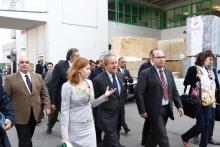On 22-25 May, all 28 EU Member States held elections for the European Parliament. Similar to 2009, the turnout was just above 43%. The new or re-elected MEPs have a mandate for the next five years. The Parliament is now composed of 751 MEPs, representing 503.7 million habitants, with no country allowed more than 96 MEPs.
For the European Elections,
Groups
On 25 June, the
1. The EPP (European People’s Party) has elected Manfred Weber (Germany) as the new Chair of the Group.
2. The S&D (Progressive Alliance of Socialists and Democrats) is the second biggest Group. Martin Schulz (Germany), former Commission President candidate and President of the European Parliament was re-elected as group chair.
3. The ECR (European Conservatives and Reformists) is now the third biggest group lead by Syed Kamall (UK).
4. The ALDE (Alliance of Liberals and Democrats for Europe) is the fourth biggest Group with Guy Verhofstadt (Belgium) re-elected as chair.
5. The GUE (European United Left-Nordic Green Left) is in fifth position with Gabriele Zimmer (Germany) elected to chair the group.
6. The Greens/European Free Alliance have lost seats and are now only the sixth biggest group led by Rebecca Harms (Germany) and Philippe Lamberts (Belgium) as co-chairs.
7. The EFD (Europe of Freedom and Democracy) is a Eurosceptical Group led again by Nigel Farage (UK).
8. Marine Le Pen (France), leader of the French far right party Front National did not yet succeed in forming a political group which must consist of minimum 25 MEPs from at least seven Member States.
There were still some MEPs uncertain which political group they would join, and they may remain independent, known as non-attached Members. Provisional results can be found at the %$Linker:
MEPs
On 1-3 July, The European Parliament re-elected Martin Schulz (S&D, Germany) as President and appointed MEPs to Parliamentary Committees. UEPG worked mainly with Members of the following three Committees:
Industry, Research and Energy (ITRE)
Chair: Jerzy Buzek (EPP, Poland)
%$Linker:
Environment, Public Health and Food Safety (ENVI)
Chair: Giovanni La Via (EPP, Italy)
%$Linker:
Employment and Social Affairs (EMPL)
Chair: Thomas Händel (GUE, Germany)
%$Linker:
UEPG had already identified key MEPs and organised a meeting with Anne Sander (EPP, France) and Member of the Committee on Employment and Social Affairs to inform on our activities with Health and Safety top priority, and to invite her to be the host of the next UEPG Sustainable Development Awards’ Exhibition in 2015 in Strasbourg, France.
A grand coalition of the main centre-right and centre-left groups in the European Parliament was agreed in a bid to establish control over the work of the
European Commission
During an EU summit on 26-27 June, EU leaders agreed in Brussels to designate Jean-Claude Juncker as the next President of the European Commission.
Mr Juncker is the leader of the Christian Social People’s Party (CSV) in Luxembourg and served as Prime Minister of Luxembourg between 1995 and 2013 was nominated by the EPP to become President of the European Commission.
In summer National leaders will designate their commissioners to Brussels, and the new President of the Commission will have or be distributing portfolios within his team of 27 commissioners.
Portfolios usually mainly monitored by UEPG are DG Enterprise and Industry for a better access to local resources and reindustrialisation; DG Employment, Social Affairs and Inclusion as Health and Safety is our top priority with Zero Harms target, and DG Environment to promote the ongoing work of the sector and prevent further constraints on the sector.
In September, each commissioner will be scrutinised in individual hearings before Parliament committees and in October the European Parliament will vote to approve or reject the new Commission College as a whole.
In November the new Commission will take office.
UEPG monitors closely each of the above steps to keep its members informed.






